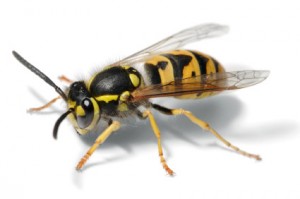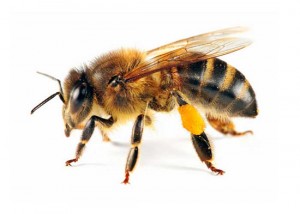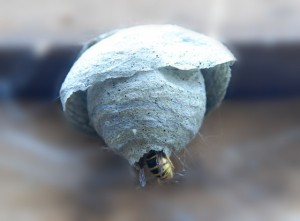Posted on May 19, 2016 in Pest
Wasp Prevention Tips

Wasp
Wasps are most active in the warm summer months. In the UK, the Common Wasp and German Wasp cause the most annoyance and painful stings. Even with their special yellow and black body, they can still be confused with hornets, although hornets are not as common in this country, they can still bite and sting you.

Honey Bee
Wasps can also be confused with bees, in particular Honey Bees – however these vary in colour from golden brown to almost black and are furrier than wasps. If you suspect you have Honey Bees, visit the British Bee Keepers Association find a swarm collector site, to find a bee keeper local to you.
Only female wasps have a sting which they can use repeatedly, if they feel under threat. In most cases a wasp sting causes no long term harm, but it can be life threatening if you are allergic to stings. Treating a wasp nest is often the most efficient way to control a wasp problem and reduce the threat of stings.
Wasps can build nests outdoors under eaves or, if they can gain access, they can find sheltered areas inside your home, such as wall cavities, roof spaces and attics. If a nest is discovered in early spring, removal using DIY products may be possible but the danger from stings will remain.
Wasps have the potential to attack in large numbers if their nest is disturbed.
It is best to treat a nest earlier in the year before numbers increase and the wasps become more aggressive, increasing the threat of stings during treatment.
Page Contents
How to Prevent Wasps
Prevention is key if you want to avoid problems with wasps, especially during the summer months when they are most active.
It is always easier to prevent a problem before it happens, rather than to wait for wasps to invade your home or garden. The fear of a wasp sting can be so great that it can prevent some people from going outdoors.
Wasp Prevention Tips
Early treatment of a wasp nest will help to keep you and your family safe from painful stings.
Making changes to your behaviour and how you handle food and drink outdoors can also help to deter this stinging pest.

Wasp Nest
Check for nests – Check your home and garden in early spring for nests, early on they will be walnut or golf ball in size – early small nests have fewer wasps and are easier to treat quickly. Look for nests in lofts, garages, sheds, cavity walls or under eaves.
Secure bins – Ensure outside bins have tightly fitting lids. Keep bins at a distance from doors and windows so wasps are not attracted to the contents.
Keep windows and doors shut – To prevent wasps entering inside your home.
Keep safe – If you have spotted a nest, make sure you keep children and pets away from the area.
Using DIY products
If you already have a problem with wasps, there are some DIY products available, including wasp repellents, which may offer some relief.
- Wait until late evening or night time, when worker and scout wasps have returned to the nest.
- Always wear protective clothing, goggles, gloves and dust mask when dealing with a wasps nest, however small it maybe.
- Use a DIY spray specifically designed for treating wasp nests, such as Rentokil wasp nest destroyer foam.
- Carefully read and follow the instructions on the spray can, ensuring you do not stand directly under the nest.
- Once sprayed leave the nest for a minimum of 24 hours before careful removal – a wasp nest can be very fragile.
- Seal the nest in two thick plastic bags (double bagged) and dispose of it in an outside rubbish bin with a secure lid.
A wasp nest should not be removed directly after being professionally treated with insecticide. It can take several days for foraging worker wasps to return to the nest.
As wasps return and enter the nest they will also be contaminated by the treatment and die off, thus ensuring the whole colony is effectively treated.
You should never try to treat a nest on your own, or if you think you are allergic to insect stings.
Preventing Wasp Problems
Although high numbers of wasps in your home or garden almost certainly means there is a nest nearby, removing a wasp nest may not always be a possible solution.
If the nest is not on your property, you will have very limited control on what you can do to remove it.
Nests located in confined, hard-to-reach areas (such as cavity walls) will also be more difficult to treat.
Need a professional solution?
For peace of mind and to be completely safe from stings, it is safer to let a professional Protech Pest Solutions technician treat the nest for you.
For more advice or to book an engineer please Call 0845 604 1288 and speak with one of our friendly team or for more information on our pest control service please visit Protech Pest Solutions.
Categories
- Building Maintenance
- Cleaning
- Electrical
- Gardening
- General Info
- Our Service
- Pest
- Security
- Uncategorized
- Waste Solutions
Archive
- April 2024
- March 2024
- February 2024
- January 2024
- December 2023
- November 2023
- August 2023
- April 2023
- February 2023
- January 2023
- December 2022
- November 2022
- October 2022
- September 2022
- August 2022
- July 2022
- June 2022
- May 2022
- April 2022
- March 2022
- February 2022
- January 2022
- December 2021
- October 2021
- September 2021
- August 2021
- July 2021
- June 2021
- May 2021
- April 2021
- March 2021
- February 2021
- January 2021
- December 2020
- November 2020
- October 2020
- September 2020
- August 2020
- July 2020
- June 2020
- May 2020
- April 2020
- March 2020
- February 2020
- January 2020
- December 2019
- November 2019
- October 2019
- September 2019
- August 2019
- July 2019
- June 2019
- May 2019
- April 2019
- March 2019
- February 2019
- January 2019
- December 2018
- November 2018
- October 2018
- September 2018
- August 2018
- July 2018
- June 2018
- May 2018
- April 2018
- March 2018
- February 2018
- January 2018
- December 2017
- November 2017
- October 2017
- September 2017
- August 2017
- July 2017
- June 2017
- May 2017
- April 2017
- March 2017
- February 2017
- January 2017
- December 2016
- November 2016
- October 2016
- September 2016
- August 2016
- July 2016
- June 2016
- May 2016
- April 2016
- March 2016
- February 2016
- January 2016
- December 2015
- November 2015
- October 2015
- September 2015
- August 2015
- July 2015
- June 2015
- May 2015
- April 2015
- March 2015
- February 2015
- January 2015
- October 2014
- May 2013
- April 2013
- November 2011
- September 2011
- June 2011
- January 2011
- December 2010
- November 2010

